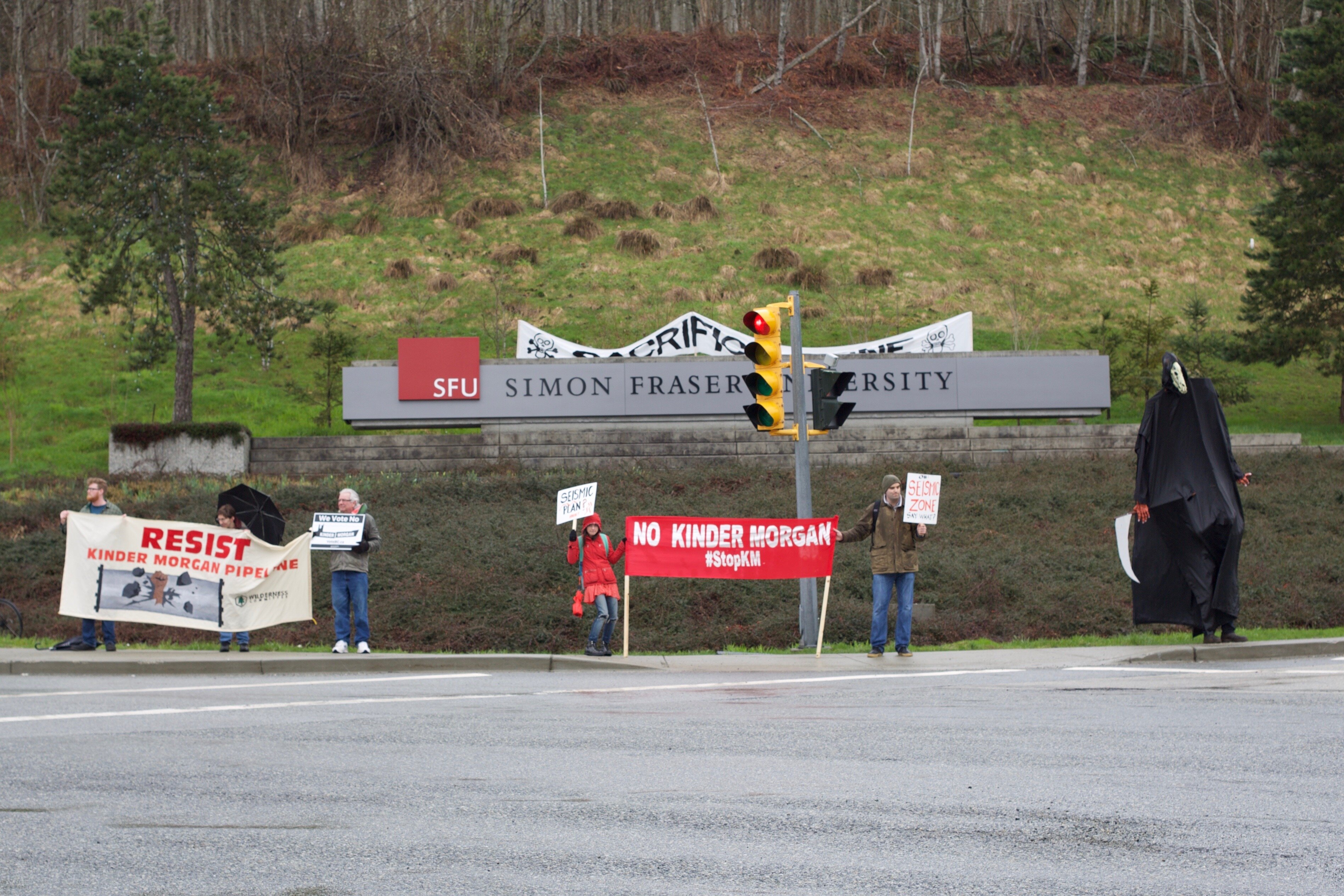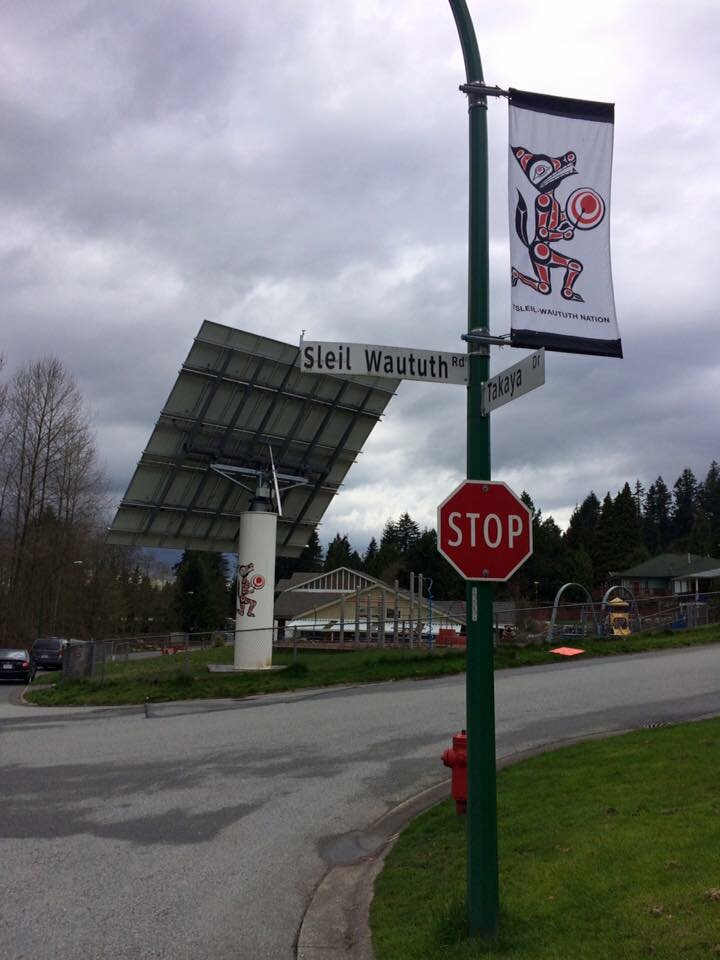Amid oil-spill fears, First Nations and cities are uniting to fight the Trans Mountain Expansion Project
An alliance between First Nations and Metro Vancouver cities has grown out of concerns over a possible oil-tanker spill and First Nations’ unique ability to challenge the federal government and pipeline company Kinder Morgan.

Burnaby Mayor Derek Corrigan has been trying to stop Kinder Morgan’s Trans Mountain Expansion Project in court for years, unsuccessfully. Pipelines are a provincial and federal decision, even if local communities are taking the brunt of the environmental risk. But Corrigan has realized if he aligns with the fight of a local First Nation, the Tsleil-Waututh, his city’s voice can be heard through theirs.

Burnaby Mayor Derek Corrigan (right) stands with former Tsleil-Waututh chief Leonard George (left). Corrigan says because cities have no say in pipelines, he's lucky to be able to support the Tsleil-Waututh who carry the fight against Kinder Morgan further than he can.
Corrigan shared this sentiment in a small roundtable discussion I facilitated on the Tsleil-Waututh reserve in North Vancouver on Monday. I’m spending this week travelling part of the Trans Mountain oil pipeline and tanker route with Discourse Media and Reveal from The Center for Investigative Reporting. The goal is to hear the questions and concerns of people who will be directly impacted if the twinning of the pipeline from Alberta’s tar sands to Burnaby moves ahead, to help inform our reporting of the project.
The Tsleil-Waututh, whose traditional territory encompasses the project’s marine terminal and tanker route, are attempting to have the Trudeau government’s approval of the project overturned in court. They claim they were not properly consulted before the project was approved. The legal notion of consultation, as well as consent, concepts which stem from Indigenous peoples unique and pre-colonial relationship to the land and water, dominated much of the discussion.
And this idea of a municipality relying upon the unique land rights of a First Nation to protect their collective environmental and social interests, fostering local reconciliation, had to be my key takeaway from this discussion.
Uplifting their neighbours
Corrigan said, “cities have no constitutional status in Canada. We’re the children of the provincial government. The provincial government says what cities can or can’t do. And this alliance that’s been formed between cities and First Nations comes because First Nations have constitutional status and they have the ability to lift this argument up for all of us into the courts and to be able to defend our interests at the same time they’re defending the interests of their own nations.”
Last month, the B.C. Court of Appeal ruled that the National Energy Board can override municipal by-laws, effectively ending Corrigan’s attempts at stopping the project in court. This conflict dated back to 2014 when the NEB granted Kinder Morgan permission to conduct field studies on Burnaby Mountain, which meant cutting down trees and drilling boreholes against the city’s permission. But Corrigan is hopeful the Tsleil-Waututh have enough legal sway to stop the project for good.
“We are the lucky recipients of that additional protection because, as we come along with them saying we’re sharing the same worries about our populations and our communities, we’re able to get to places we weren’t able to get to in the court system. That’s a huge benefit and I think it’s established a much closer relationship between cities and First Nations than existed before,” he said.
Leading the resistance
The Tsleil-Waututh fear that a potential oil spill in the Burrard Inlet would devastate the marine ecosystem they rely upon for sustenance and cultural purposes. “It’s not in our backyard, it’s in our kitchen,” Tsleil-Waututh Councillor Charlene Aleck has said numerous times to reporters.

The roundtable discussion included Aleck, former chief Leonard George and youth Cedar Parker-George, three generations of Tsleil-Waututh people. Their stance has been straightforward now for years: the risk to the coast is not worth the benefits of jobs or cash payments from the company.
“I can’t put a price on what it would cost for me to teach my granddaughter how to put a paddle in the water. There’s nothing out there. There’s no amount,” said Aleck.
Parker-George, the enthusiastic son of outspoken Tsleil-Waututh activist Reuben George, comes from a long lineage of coastal land defenders and is bracing himself for whatever happens if construction starts later this year.
“Is there going to be a Standing Rock? I don’t know,” he said.
“But people are starting to rise up. I really think that we're going to stop this.”
Can Tsleil-Waututh stop the project?
But if the Tsleil-Waututh stop the project in court, a Standing Rock-level event may not be necessary. UBC Political Science professor George Hoberg is an expert on the regulatory process behind pipeline decisions. He took part in our roundtable and I asked him if he thinks Trans Mountain has a better chance of surviving a court battle with First Nations than Enbridge’s Northern Gateway Pipeline proposal, which was shot down over similar claims last year.
“The federal government in this case very carefully watched what the Harper government did with the Northern Gateway pipeline and saw how terribly it failed in showing respect towards First Nations towards the end stages of consultation. The Trudeau government has tried to be more respectful. I do think they are probably better protected if the court uses the same standard it used in the Northern Gateway pipeline case,” said Hoberg.
“But what I see the potential for is a major shift in doctrine here that the Kinder Morgan lawsuits are likely to test, and that in particular is this concept of consent,” he added.
We then talked about the United Nations Declaration on the Rights of Indigenous Peoples, which states that governments need the “free, prior and informed consent” of Indigenous peoples before moving ahead with resource development. The Trudeau government fully endorsed that document, and campaigned on renewing a “nation-to-nation relationship” with Indigenous peoples. Approving the Trans Mountain Expansion Project against the wishes of the Tsleil-Waututh clearly contradicts that.
“When it came down to this particular pipeline proposal, the language they used was the exact same traditional language that the free, prior and informed consent doctrine was meant to move away from. There seems to be this disjuncture between their commitments to an international U.N. agreement and their practice on the ground in this case that I think we need to explore. What courts do with that, we don’t know yet,” said Hoberg.
What’s the likelihood of a spill?

At the end of the day, putting all legal stuff aside, the Tsleil-Waututh are fighting for their water. The risk of an oil spill is their main concern, and they’re not alone in that fear. The night before our roundtable in Tsleil-Waututh, I checked out a “Pints not Pipelines” fundraiser on Granville Island. Local activists and breweries raised $17 thousand for the Tsleil-Waututh legal costs. I couldn’t help but think there is nothing more Vancouver than using craft beer to protest a pipeline.
In the weeks leading up to this trip, I began collecting questions that people have about the project through this survey. The idea is that we want our reporting to directly answer questions that our audience has about the project. And one of the main questions that came up was what is the likelihood of a tanker spill in Vancouver’s harbour if the Expansion Project moves ahead?
Well we’ve been digging into that and will continue to. What do we know at this point? This question is hard to answer because there are so many factors, biases and differing methodologies in estimating probability or likelihood.
Kinder Morgan claims a "credible worst case scenario" — a spill of 16.5 million litres, or approximately 140,000 barrels — "might occur" once in every 2,841 years. They believe a smaller spill is more likely, and might occur once in every 284 years..
The Tsleil-Waututh did their own assessment report of the project and their experts estimate that a "reasonable worst-case spill," of 16 million litres or approximately 135,000 barrels, has a 29 per cent likelihood of occurring over fifty years. The likelihood of any spill? They believe there's a 79 to 87 per cent chance.
The Concerned Registered Professional Engineers estimate a 10 per cent probability over 50 years.
David Etkin, Graduate Program Director, Emergency and Disaster Management, York University wrote, “if the traffic increases from 5 to 34 tankers per month, the probability would increase by about a factor of 7.”
The point is, there is a range of claims, it’s getting late as I’m writing this and all these numbers are giving me a headache. There could be a spill, there could not be a spill. But from what I gather, the Tsleil-Waututh don’t want to take any risk.
